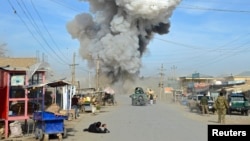The United Nations says conflict-related deaths and injuries among Afghan civilians rose 22 percent in 2014, mostly because of an increase in ground fighting between warring parties. The world body blamed the Taliban and other insurgents for most of the civilian casualties.
The U.N. Assistance Mission in Afghanistan says the number of civilian casualties documented in its annual report is the highest in a single year since 2009.
Speaking in Kabul, UNAMA Director of Human Rights Georgette Gagnon said the rise in casualties is due to intensified ground fighting between Afghan forces and insurgents, using weapons like rockets, mortars and grenades in and near civilian populated areas. She cited the withdrawal of international forces and combat air support for increased ground engagements.
“The U.N. documented 10,548 civilian casualties in 2014," said Gagnon. "This included 3,699 civilians killed, which is up 25 percent, and 6,849 civilians injured, up 21 percent, for 22 percent increase in total civilian casualties over 2013. Civilian casualties from ground operations, surged, making them the leading cause of civilian casualties and the biggest killers of Afghan women and children in 2014.”
Gagnon says the report implicated the Taliban and other insurgents for 72 percent of all civilian deaths, and government and international forces, respectively, for 14 percent and two percent. U.N. researchers could not determine which party was responsible for the rest of the cases.
Gagnon added that improvised explosive devices used by insurgents, commonly known as IEDs, were the second leading cause of civilian casualties, followed by increased numbers of suicide attacks in 2014.
She read a message from the U.N. human rights chief reiterating that these unacceptable deliberate and indiscriminate attacks on Afghan civilians may amount to war crimes, and all parties are bound to respect their international obligations.
“Documenting these trends should not be regarded as a body count but as a vital step towards accountability," said Gagnon. "It is high time that states live up to their responsibility to protect civilians and that perpetrators of war crimes and other violations understand that they will face justice for what they have done.”
Nicholas Haysom, the head of the U.N. mission in Kabul, urged the Taliban to abide by their public commitments to avoid civilian casualties and stop deliberately attacking civilians.
“They (the Taliban) have accepted in their engagements with us that protection of the civilians is important and have pledged to take certain measures to eradicate civilian casualties from their own part," said Haysom. "We have gratifyingly seen public commitments. Now is the time for results.”
The Taliban told VOA it rejects the U.N. report on civilian casualties, because it is one sided and the reported statistics have been provided by its enemies ("the Mujahideen").












